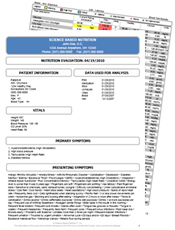- B6 plays a vital role in supporting your blood, brain, immune system and metabolism, among other areas
- Signs of B6 deficiency include anemia, confusion, depression, mouth and tongue inflammation and a weakened immune system
Vitamin B6 (pyridoxine) is a water-soluble vitamin first isolated in the 1930s.1 The human body cannot synthesize B6, so one must obtain this nutrient from the diet or in the form of a dietary supplement. B6 is naturally present in many foods, added to others (like fortified breakfast cereal). B6 is a generic term for a number of compounds with vitamin B6 activity, namely:2,3
- Pyridoxine, an alcohol
- Pyridoxal, an aldehyde
- Pyridoxamine, which contains an amino group
- And their phosphorylated forms
About B6, the U.S. National Institutes of Health (NIH) writes:
Vitamin B6 in coenzyme forms performs a wide variety of functions in the body and is extremely versatile, with involvement in more than 100 enzyme reactions, mostly concerned with protein metabolism. Vitamin B6 also plays a role in cognitive development through the biosynthesis of neurotransmitters and in maintaining normal levels of homocysteine, an amino acid in the blood, which is a signal of inflammation.
Food chart showing B6 levels in common foods:

Top Health Benefits of Vitamin B6
Balances your blood sugar — a 2015 study published in the Journal of Diabetes Research4 found vitamin B6 helped regulate blood glucose levels and insulin release in lab mice. The study authors said, “Vitamin B6 prevents endothelial dysfunction, insulin resistance and hepatic lipid accumulation. Supplementation of [vitamin] B6 should be considered to prevent metabolic syndrome.”5
Benefits your skin and hair — Based on at least one study performed on lab rats, vitamin B6 has been shown to alleviate dermatitis, thereby promoting healthier, clearer skin.6
Bolsters your immune system — B6 is involved with the production of lymphocytes (white blood cells), which help your body fight infection. A study involving lab mice showed a lack of B6 “retards growth, inhibits lymphocyte proliferation and interferes with its differentiation,” suggesting B6 deficiency can influence immunity.7 A 2006 study done in Taiwan demonstrated that B6 supplementation has a beneficial effect on immune responses in critically ill patients.8
Boosts your brain power — Studies of pregnant and lactating women and their offspring indicate that a mother’s deficiency in vitamin B6 can alter the function of the neurotransmitters thought to play important roles in their child’s learning and memory.9
A small study involving 8- to 15-year-old children with mood and behavioral problems demonstrated a vitamin-mineral supplement containing 7 mg of B6 was effective to “exert a stabilizing effect on mood, temper and anxiety in a manner that is relatively independent of diagnostic category.”10
Protects against oxidative stress — Vitamin B6 has also been found as an antioxidant to be helpful in addressing diabetes complications, cognitive aging and the prevention of coronary heart disease.11 A 2012 study indicates a B6 deficiency that coexists with low folate or anemia was associated with depressive mood in elderly patients.12
The study authors said, “Elderly people with coexisting marginal deficiencies of nutrients involved in the S-Adenosyl methionine (SAMe) and hemoglobin production were more likely to experience depressed mood and emotion that affect daily activity.”13
Experts from Mayo Clinic additionally suggest B6 may be useful to control high levels of homocysteine in your blood.14 Elevated homocysteine levels may increase your risk of cardiovascular disease and stroke. Additionally, B6 supplementation has been shown to reduce the severity of morning sickness during pregnancy, as well as soothe symptoms of premenstrual syndrome (PMS) and PMS-related depression.15,16
Clearly, vitamin B6 is a necessary nutrient hat has been shown to be useful in addressing a variety of health concerns, talk to Dr. Ventola before attempting to address any health conditions with B6 supplementation. Testing is the key and if blood and hair testing show a need for some support this nutrient could be invaluable in a number of key areas.
References:
- 1 Oregon State University Linus Pauling Institute, Vitamin B6
- 2 U.S. National Institutes of Health September 17, 2018
- 3 “Dietary Reference Intakes: Thiamin, Riboflavin, Niacin, Vitamin B6, Folate, Vitamin B12, Pantothenic Acid, Biotin, and Choline”
- 4, 5 Journal of Diabetes Research December 31, 2015 [e-Pub ahead of print]
- 6 Biochemical Journal May 1936; 30(5): 845–848
- 7 Journal of Immunology Research March 6, 2107 [e-Pub ahead of print]
- 8 European Journal of Clinical Nutrition 2006; 60: 1207-1213
- 9 Nutrition Reviews, July 1, 1993, Volume 51, Issue 7
- 10 Journal of Child and Adolescent Psychopharmacology 2004; 14(1): 115–122 [PDF]
- 11 Free Radical Biology and Medicine, February 15, 2004, Volume 36, Issue 4
- 12, 13 Journal of Geriatric Psychiatry and Neurology September 2012; 25(3):170-178
- 14 Mayo Clinic October 17, 2017
- 15 Obstetrics and Gynecology July 1991; 78(1): 33-36
- 16 BMJ May 22, 1999; 318(7195):1375-1381




